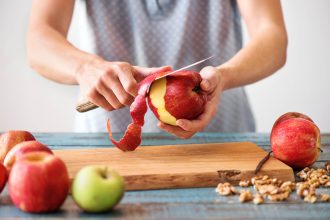Are All Sugars the Same? October 24, 2016
Hi everyone! This is Rebecca, HelloFresh’s in-house Dietitian, reporting for blogging duty. You may have seen me cooking up a storm live on Facebook, but today I’m here to talk about sugar. After all, Halloween is around the corner, so there’s no better time to get the facts about sugar straight and learn the differences between natural and added sources of the sweet stuff.
All sugars are created equal, right?
Not exactly. Natural sugars are found primarily in fruits, veggies, and milk – they provide vitamins, minerals, and fiber. On the other hand, added sugars are, as the name suggests, added during production or processing. They offer excess calories and can contribute to weight gain by taking away from the number of nutrient-rich foods you can eat while still staying within your calorie limits.
Why should I care?
The new 2015 USDA Dietary Recommendations advise Americans to limit their sugar intake to no more than 12 teaspoons per day (about 48 grams). This may sound easy on paper, but our taste buds are being assaulted daily. We’ve become so sugar addicted that it’s not uncommon to find added sugars in ingredients like tomato sauce, yogurt, breakfast cereals, and bread (yes, bread). The worst offenders are soda and sweetened fruit drinks. In fact, the last 20 years have shown a 35% increase in the amount of fruit drinks and a 41% increase in the soda we drink.
What’s the deal with honey?
Honey:
- Lightly processed or in raw form, leaving intact small amounts of vitamins and minerals as well as beneficial antioxidants
- 1 Tablespoon = 68 calories and 17 grams of carbs
- Triggers a delayed insulin response, giving the body more time to respond to the sugars
White Granulated Sugar:
- Processed and stripped of beneficial vitamins and minerals
- 1 Tablespoon = 49 calories and 15 grams of carbs
- Triggers a quick insulin response, impatiently demanding attention from the pancreas
UPCOMING RECIPE: Honey and Orange Chicken Jambalaya with Tomato Rice
Sooooo what do you recommend?
Fill up on fruit: Fruit is naturally sweet and loaded with fiber to slow down the release of sugars and prevent blood sugar from spiking. Essentially, fruit tricks your taste buds into thinking they are getting a treat! Sneaky sneaky…
Eat in moderation: Overeating sugars in any form will lead to an increase of calories, which can contribute to weight gain. But does this mean you should give up the sweet stuff entirely? Of course not! Aim for no more than 2.5 grams of added sugar per 100 calories. For women, limit added sugars to 25 grams/day (6 teaspoons). For men, limit to 38 grams/day (9 teaspoons).
Read food labels: Sugar can go by many names: sucrose, fructose, dextrose, lactose, honey, cane sugar, raw sugar, turbinado sugar, corn sugar, high fructose corn syrup, fruit juice concentrate, and malodextrin. If any of these appear as one of the first three ingredients, think twice.
Speaking of reading your food labels closely, learn how to properly read for nutrition.









